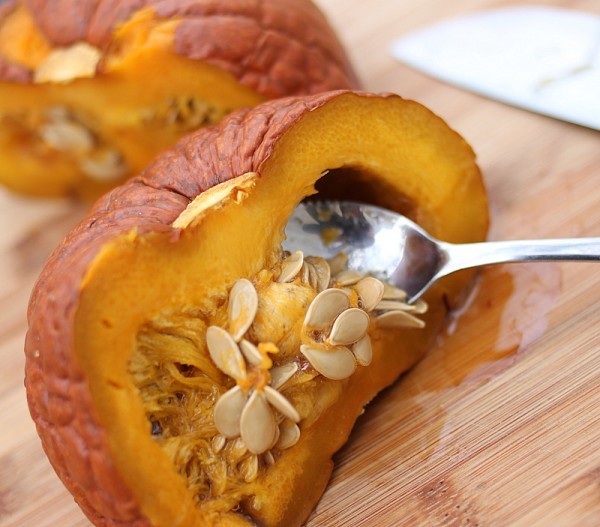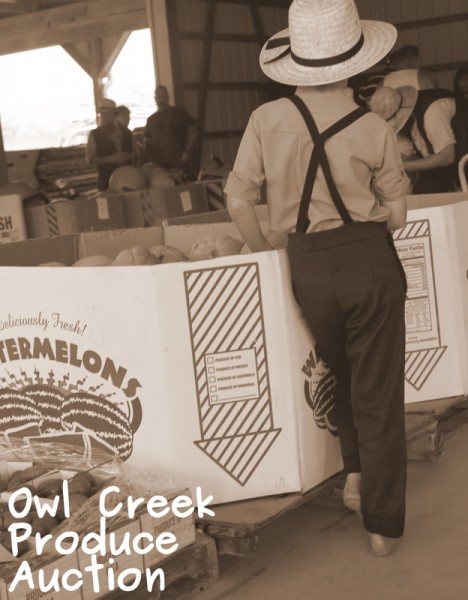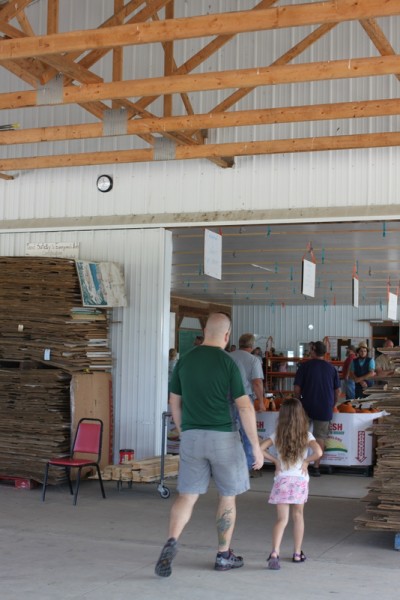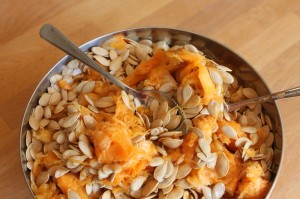Tonight we carved jack o lanterns, also called Pumpkin Moonshines according to a sweet picture book of the same name. Our kitty Moonshine was not impressed.
Happy Halloween!
Your Custom Text Here
Tonight we carved jack o lanterns, also called Pumpkin Moonshines according to a sweet picture book of the same name. Our kitty Moonshine was not impressed.
Happy Halloween!
Last year I saw Jamie Oliver post an amazing Halloween display with scarred squash. I booked marked the idea in my mind and am now scoring all our volunteer squash plants. All you need is a sharp knife blade or skewer and a young winter squash. Without removing the pumpkin, butternut, or other variety squash from the plant, score a design lightly into the skin of the squash.
Then, let the plant grow. It will weep a little liquid in the first twenty four hours and then begin to form a brownish scar. As the squash continues to ripen and change color, the scar will balloon slightly but stay brown.
This intervention could potentially weaken or draw disease to the fruit but thus far our scarred squash are growing just the same as the non-scarred fruit on the same plants.
The possibilities for these decorations are endless. We've drawn shapes, jack-o-lantern faces, initials, and messages that we'll show off later in the season. And the best part is that the scarred squash will still be edible!
Are you already thinking about autumn? If you're looking for a few gardening ideas, try signing up for my Fall Gardening class where we'll talk about autumn crops, cover cropping, and season extension.
 Sometimes my life is forever changed by the simplest updates in cooking technique. Such a moment happened a few weeks ago when we went to a friend's cabin.
Sometimes my life is forever changed by the simplest updates in cooking technique. Such a moment happened a few weeks ago when we went to a friend's cabin.
Lacey had a pie pumpkin and roasted it so simply. She yanked off the top, popped it in the oven, and cooked. No pounding with a cleaver, no smashing on the sidewalk (look at Lil so little in that video!), no scraping out the insides. Because the squash steams itself from the inside, it takes just as long as halving and roasting, approximately 45 minutes per small squash.
The flesh never ends up burnt as it occasionally does when I roast halves too long without enough water. The finished squash, which is done when the skin yields to the pressure of your finger, is not only easier to open and scoop, but the seeds are pre-steamed. When I roasted the seeds in the oven, the resultant seeds are crispy outside but tender inside, perfect for snacking.
This is the best technique. I can't believe I've been roasting squash for so long in any other way. Do what I say, not what I do - cook your squashes whole from now on!
On Monday, Alex, Lil, and I trekked an hour north of Columbus for three hours of entertainment, education, groceries and snacks for only $16.25. Where was this great amusement? The Owl Creek Produce Auction at 20999 Waterford Rd. Fredericktown, Ohio 43019.

The auction begins with delivery of goods, mostly from Amish farms. The horse carts are unloaded into a large barn and grouped roughly according to lot size. Small lots for homeowners are under the eaves outside of the main building.
Before bidding starts, shoppers are welcome to wander through the offerings. Each bidder requires a number, available for free at the registration desk.
On the day we visited, two auctioneers sold the lots. A microphoned auctioneer, assistant, and recorder worked the big lots while a second set of non-micked men worked the outside smaller lots. The microphoned auctioneer also sold lots directly off the horse-pulled carts from a small tented stand.
The auctioneer described each lot quickly and started bidding. Many lots were split into parts wherein the bid was multiplied by the number of parts the bidder wanted, i.e. a lot of a dozen cabbages were bid on a per-cabbage basis and then multiplied by the number of cabbages the winner chose. A recorder noted the final price and winner bid number. A market manager posts average prices on the Owl Creek Produce Auction Report website.
I held off from bidding for awhile to observe how the auction worked. Lil encouraged me to bid on a lot of small pumpkins which I won for 50 cents a pumpkin, or $6.50 for the lot of 13. As soon as the bidding finishes, the winner can load their lot into their vehicle.
Until we won the pumpkins, Lil was totally confused about what was happening. She wanted to buy and know how much each item was going to cost. We explained that auctions are a good time to use our experience to estimate the value of goods. "How much would you pay?" we asked Lil.
Next, Lil had her eye on mums. The prices were great at $4.50 per gallon pot but the lot sizes were between 4 and 6 pots. I didn't need a lawn full of mums so I passed. I gathered that this week was the first for mums and perhaps in coming weeks the prices will be lower. Lil was sorry that we didn't get any flowers - another good lesson about auctions.
I eyed produce and some of it went for great prices, most notably a whole bushel of sweet banana peppers sold for just $1.00. The growing conditions were not advertised and therefore I wasn't interested in most of it. I prefer, especially for preserving, to use organic produce.
Lil spied a peck of small pears that were obviously chemical free - speckled, bird-pooped-upon, and not at all uniform. I managed to win them for $3.50. When we tasted them in the car on the way home, we discovered what a treat Lil found as the pears are tender and delicious.
The auction was well attended with people of all ages and backgrounds. Most of the buyers were non-Amish. Some seemed to be purchasing for small businesses while others were home cooks like myself. Several times I felt over-crowded but fresh air was only a few steps away.
We wandered away to look at new lots coming in and admire the horses. We ordered a reasonably priced but not Amish-made snack from a food stand behind the barn. Portable restrooms were available.
When we tired and were ready to go home, we took our bidder number back to the registration desk. Through a paper check system, the cashier quickly pulled up our lot prices and took our payment.
If you go:
Owl Creek Produce Auction 20999 Waterford Rd. Fredericktown, Ohio 43019 740-627-1660 Monday – 11:00 am, Wednesday- 10:00 am, Friday- 9:00 am through the end of October
 Don't throw away (or compost) the innards of your pie or jack-o-lantern pumpkins! Amongst the tricky pith are treats, delicious seeds! By the way, a serrated grapefruit spoon is my favorite tool for scooping pumpkin flesh.
Don't throw away (or compost) the innards of your pie or jack-o-lantern pumpkins! Amongst the tricky pith are treats, delicious seeds! By the way, a serrated grapefruit spoon is my favorite tool for scooping pumpkin flesh.
Soak the pumpkin innards in water for a bit and then separate seeds from stringy pulp by hand.
Rinse the seeds in clear water again until they are completely free of orange goop. Strain through a sieve to remove most of the water.
Place seeds in a shallow layer on a cookie sheet pan. Sprinkle them with soy sauce and Old Bay. For this batch of seeds from 8 pie pumpkins, I used about a teaspoon of each.
Roast in a 300 degree oven for about an hour, turning every 15 minutes.
Let cool and enjoy! Unlike candy treats, home roasted pumpkin seeds are a good source of protein, fiber, and zinc.
Keep leftovers in an airtight container at room temperature for up to a year.
NB: You can save raw (un-roasted) seeds for planting next year by removing them from the pith and placing on a coffee filter to dry completely. Most pumpkins are non-hybridized, meaning they will readily grow and produce fruit from seed. Store thoroughly dry seeds in a paper envelope and direct sow in June for ripe pumpkins near Halloween time.
This post was added to Hearth and Soul Volume 19.
'Tis the season to eat pumpkins. Making your own puree for pie, soups, and baking is a simple and delicious. Here's how: Choose your pumpkin. Pie pumpkins have the richest flavor but you can do this with any pumpkin if you wish.
Halve your pumpkin.

Remove the innards. I like to use a grapefruit spoon because the serrated edge helps cut through the stringy bits. You can reserve seeds for roasted pumpkin seeds or garden planting if you wish.

Place halves skin side up on a sheet pan.

Roast in a 350 degree oven for 30 -60 minutes depending on the size of your pumpkin. You will know they are done when the pumpkins are soft to the touch and look deflated like below.

Flip over and allow to cool.

Remove the skin from the roasted pumpkin. For a finer product, puree with a food mill or blender.

Use immediately or prepare to store in the freezer. If you are really wise (I was not) you can measure the puree now and mark quantity on the outside of the freezer bag.

Seal and place flat in the freezer. Puree will keep in the freezer for up to 12 months. Simply put in a bowl of water to thaw before use.

Making pumpkin puree is not necessarily more economical than purchasing it. A 15 ounce can of organic pumpkin puree is $2.79 at my local gourmet store; that's $0.19 per ounce. I paid $6.50 for these three pie pumpkins and measured 2 pounds 8 ounces weight of the three packages of puree. Hand made puree was, therefore, $0.16 per ounce. A tiny savings, but not much really.
Economy comes into play if I grow my own pumpkins, which I plan to do next year. The pumpkins will then cost very little, especially because I swiped seeds from the organic pie pumpkins.
Even without huge cost savings, puree is so easy that it's worth my effort. I control the quality of the puree, homemade is less processed and therefore probably retains more nutrients, and it supports local farmers by buying pumpkins directly from them.
One of the most satisfying plants to grow, in my opinion, is squash. Zucchini, summer, acorn, butternut, pumpkin, and the like are all tremendously easy, delicious, and big. Sometimes size does matter.

Squash seeds send out large leaves just a few days after direct seeding. The leaves grow big and wide quickly. Kids love squash plants because they literally grow overnight.

Wide leaves shade out weeds and reduce the need for watering. They also hide the squash fruits, making harvesting something of an adventure.

In gardening, especially urban gardening, size does matter. Squash takes up a lot of space, but yields plenty in return. A friend of Lil's planted pumpkin seeds with his preschool class. He took the seedling home and recently measured the plant. It is 51 inches in length! Several squash varieties including zucchini can be effectively trellised to reduce some of the horizontal space needs.

Squash happens to be one of my favorite fall vegetable flavors. Zucchini is remarkably versatile fresh and can be shredded and frozen to enjoy throughout the winter. Winter squash (acorn, butternut, pumpkin) can be roasted, pureed, sauteed, or grilled. All varieties contain lots of fiber and vitamins. Winter squash can be stored whole in a cool dry place for months at a time.
Before you cook your non-hybridized* squash, consider saving some seeds. Just remove the flesh from a dozen or so seeds and set in a warm dry place until thoroughly dry. We lay ours on top of the refridgerator on a cookie cooling rack. Store in a labeled envelope and you can plant again next year. *Some hybrid plants will not grow from collected seeds. Organic seeds and seedlings are, by their organic certification, non-hybrid. It's too late to plant squash and expect a fall harvest in Ohio, but warmer zones still have a chance to enjoy this wonder plant this season. The rest of us will wait until the spring.
------
Can someone help me remember to plant pumpkin seeds at the appropriate time to grow our own jack-o-lanterns? That would be fun.